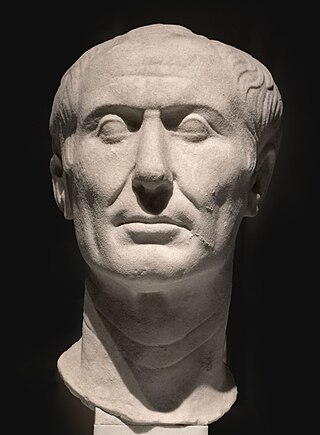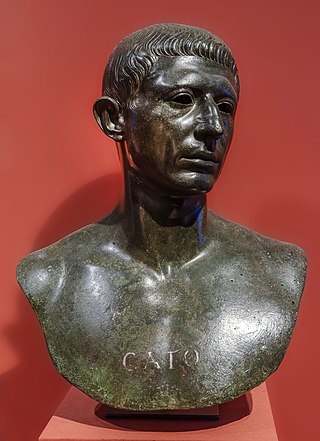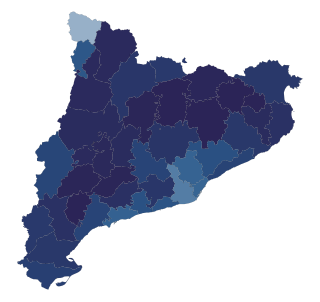Related Research Articles

Gaius Julius Caesar Augustus, also known as Octavian, was the founder of the Roman Empire. He reigned as the first Roman emperor from 27 BC until his death in AD 14. The reign of Augustus initiated an imperial cult, as well as an era of imperial peace in which the Roman world was largely free of armed conflict. The Principate system of government was established during his reign and lasted until the Crisis of the Third Century.

The cursus honorum was the sequential order of public offices held by aspiring politicians in the Roman Republic and the early Roman Empire. It was designed for men of senatorial rank. The cursus honorum comprised a mixture of military and political administration posts; the ultimate prize for winning election to each "rung" in the sequence was to become one of the two consuls in a given year.

Gaius Julius Caesar was a Roman general and statesman. A member of the First Triumvirate, Caesar led the Roman armies in the Gallic Wars before defeating his political rival Pompey in a civil war, and subsequently became dictator from 49 BC until his assassination in 44 BC. He played a critical role in the events that led to the demise of the Roman Republic and the rise of the Roman Empire.

The First Triumvirate was an informal political alliance among three prominent politicians in the late Roman Republic: Gnaeus Pompeius Magnus, Marcus Licinius Crassus, and Gaius Julius Caesar. The republican constitution had many veto points. In order to bypass constitutional obstacles and force through the political goals of the three men, they forged in secret an alliance where they promised to use their respective influence to support each other. The "triumvirate" was not a formal magistracy, nor did it achieve a lasting domination over state affairs.

A filibuster is a political procedure in which one or more members of a legislative body prolong debate on proposed legislation so as to delay or entirely prevent a decision. It is sometimes referred to as "talking a bill to death" or "talking out a bill", and is characterized as a form of obstruction in a legislature or other decision-making body.

Marcus Porcius CatoUticensis, also known as Cato the Younger, was an influential conservative Roman senator during the late Republic. His conservative principles were focused on the preservation of what he saw as old Roman values in decline. A noted orator and a follower of Stoicism, his scrupulous honesty and professed respect for tradition gave him a political following which he mobilised against powerful generals of his day, including Julius Caesar and Pompey.
Marcus Calpurnius Bibulus was a politician of the Roman Republic. He was a conservative and upholder of the established social order who served in several magisterial positions alongside Julius Caesar and conceived a lifelong enmity towards him. In 59 BC, he was consul alongside Julius Caesar. Their partnership was contentious to the extent that Caesar's supporters assaulted Bibulus in Rome's main forum on the eve of an important vote. Bibulus withdrew from public politics for the rest of his term.

The Curiate Assembly was the principal assembly that evolved in shape and form over the course of the Roman Kingdom until the Comitia Centuriata organized by Servius Tullius. During these first decades, the people of Rome were organized into thirty units called "Curiae". The Curiae were ethnic in nature, and thus were organized on the basis of the early Roman family, or, more specifically, on the basis of the thirty original patrician (aristocratic) clans. The Curiae formed an assembly for legislative, electoral, and judicial purposes. The Curiate Assembly passed laws, elected Consuls, and tried judicial cases. Consuls always presided over the assembly. While plebeians (commoners) could participate in this assembly, only the patricians could vote.

A consul was the highest elected public official of the Roman Republic. Romans considered the consulship the second-highest level of the cursus honorum—an ascending sequence of public offices to which politicians aspired—after that of the censor, which was reserved for former consuls. Each year, the Centuriate Assembly elected two consuls to serve jointly for a one-year term. The consuls alternated each month holding fasces when both were in Rome. A consul's imperium extended over Rome and all its provinces.

Caesar's civil war was a civil war during the late Roman Republic between two factions led by Gaius Julius Caesar and Gnaeus Pompeius Magnus (Pompey), respectively. The main cause of the war was political tensions relating to Caesar's place in the republic on his expected return to Rome on the expiration of his governorship in Gaul.

Commentarii de Bello Civili(Commentaries on the Civil War), or Bellum Civile, is an account written by Julius Caesar of his war against Gnaeus Pompeius and the Roman Senate. It consists of three books covering the events of 49–48 BC, from shortly before Caesar's invasion of Italy to Pompey's defeat at the Battle of Pharsalus and flight to Egypt. It was preceded by the much longer account of Caesar's campaigns in Gaul and was followed by similar works covering the ensuing wars against the remnants of Pompey's armies in Egypt, North Africa, and Spain. Caesar's authorship of the Commentarii de Bello Civili is not disputed, while the three later works are believed to have been written by contemporaries of Caesar.

The executive magistrates of the Roman Empire were elected individuals of the ancient Roman Empire. During the transition from monarchy to republic, the constitutional balance of power shifted from the executive to the Roman Senate. During the transition from republic to empire, the constitutional balance of power shifted back to the executive. Theoretically, the senate elected each new emperor, although in practice, it was the army which made the choice. The powers of an emperor, existed, in theory at least, by virtue of his legal standing. The two most significant components to an emperor's imperium were the "tribunician powers" and the "proconsular powers". In theory at least, the tribunician powers gave the emperor authority over Rome's civil government, while the proconsular powers gave him authority over the Roman army. While these distinctions were clearly defined during the early empire, eventually they were lost, and the emperor's powers became less constitutional and more monarchical.

The history of the Constitution of the Roman Republic is a study of the ancient Roman Republic that traces the progression of Roman political development from the founding of the Roman Republic in 509 BC until the founding of the Roman Empire in 27 BC. The constitutional history of the Roman Republic can be divided into five phases. The first phase began with the revolution which overthrew the Roman Kingdom in 509 BC, and the final phase ended with the revolution which overthrew the Roman Republic, and thus created the Roman Empire, in 27 BC. Throughout the history of the Republic, the constitutional evolution was driven by the struggle between the aristocracy and the ordinary citizens.
The career of Julius Caesar before his consulship in 59 BC was characterized by military adventurism and political persecution. Julius Caesar was born on 12 July 100 BC into a patrician family, the gens Julia, which claimed descent from Iulus, son of the legendary Trojan prince Aeneas, supposedly the son of the goddess Venus. His father died when he was just 16, leaving Caesar as the head of the household. His family status put him at odds with the Dictator Lucius Cornelius Sulla, who almost had him executed.

The Luca Conference was a 56 BC meeting of the three Roman politicians of the First Triumvirate — Caesar, Pompey and Crassus — that took place at the town of Luca, near Pisa. Luca was the southern most town in the then Roman province of Cisalpine Gaul, where Caesar was serving as Governor. The meeting renewed the fraying political alliance, and further cemented the three men's increasing consolidation of power in the Roman Republic.

Oriol Junqueras i Vies is a Catalan politician and historian. A former mayor of the municipality of Sant Vicenç dels Horts in Catalonia, Junqueras served as Vice President of Catalonia from January 2016 to October 2017, when he was removed from office following the Catalan declaration of independence and entered prison until June 2021 for his role in organizing the 2017 Catalan independence referendum. He is president of the Republican Left of Catalonia (ERC). Born in 1969 in Barcelona, Junqueras grew up in the municipality of Sant Vicenç dels Horts. After graduating from the Autonomous University of Barcelona, he taught history at the university.

The constitutional reforms of Augustus were a series of laws that were enacted by the Roman Emperor Augustus between 30 BC and 2 BC, which transformed the Constitution of the Roman Republic into the Constitution of the Roman Empire. The era during which these changes were made began when Augustus defeated Mark Antony and Cleopatra at the Battle of Actium in 31 BC, and ended when the Roman Senate granted Augustus the title "Pater Patriae" in 2 BC.

A non-binding Catalan self-determination referendum, also known as the Citizen Participation Process on the Political Future of Catalonia, was held on Sunday, 9 November 2014, to gauge support on the political future of Catalonia. While also referred to as "Catalan independence referendum", the vote was rebranded as a "participation process" by the Government of Catalonia, after a "non-referendum popular consultation" on the same topic and for the same date had been suspended by the Constitutional Court of Spain.

Elections in the Roman Republic were an essential part of its governance, with participation only being afforded to Roman citizens. Upper-class interests, centered in the urban political environment of cities, often trumped the concerns of the diverse and disunified lower class; while at times, the people already in power would pre-select candidates for office, further reducing the value of voters’ input. The candidates themselves at first remained distant from voters and refrained from public presentations, but they later more than made up for time lost with habitual bribery, coercion, and empty promises. As the practice of electoral campaigning grew in use and extent, the pool of candidates was no longer limited to a select group with riches and high birth. Instead, many more ordinary citizens had a chance to run for office, allowing for more equal representation in key government decisions.

A constitutional crisis took place in Spain from 2017 to 2018 as the result of a political conflict between the Government of Spain and the Generalitat de Catalunya under the then-President Carles Puigdemont —the government of the autonomous community of Catalonia until 28 October 2017— over the issue of Catalan independence. It started after the law intending to allow the 2017 Catalan independence referendum was denounced by the Spanish government under Prime Minister Mariano Rajoy and subsequently suspended by the Constitutional Court until it ruled on the issue. Some international media outlets have described the events as "one of the worst political crises in modern Spanish history".
References
- ↑ "Glossary of Parliamentary Procedure". Parliament of Canada. Retrieved 9 December 2018.
- ↑ Dillon, Matthew; Garland, Lynda (2005). Ancient Rome: From the Early Republic to the Assassination of Julius Caesar. Taylor and Francis. p. 545. ISBN 9780415224598.
- ↑ Canfora, Luciano (2007). Julius Caesar: The Life and Times of the People's Dictator . University of California Press. p. 130. ISBN 9780520235021.
- ↑ "Catalan parliament acts to allow absent candidate to be voted leader". Reuters. Reuters. 4 May 2018. Retrieved 9 December 2018.
- ↑ "Spanish court blocks election of separatist ex-Catalan chief". Minneapolis Star Tribune. Associated Press. 9 May 2018. Archived from the original on 30 March 2019. Retrieved 9 December 2018.